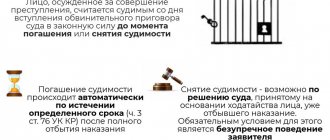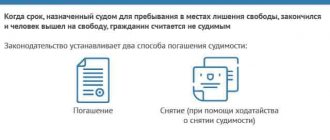The difference between removing and extinguishing the walker
Removal and expungement of a criminal record - what is the difference? The similarity of meanings is obvious - we are talking about getting rid of restrictions caused by a criminal record. Both options for avoiding consequences are impossible when the penalty is being served. Differences in concepts are established by Art. 84, 85, 86 CC:
- Part one art. 86 - repayment is the automatic end of the period of the criminal record procedure upon termination of the period fixed by law. No special regulations are required in this regard.
- Art. 84 - early withdrawal under amnesty, Art. 85 - in connection with the pardon. Shares are carried out by court decision.
- Part 5 art. 86 takes into account the elimination of a criminal record in order to reward the convicted person for good behavior. If a citizen released from prison has no violations of the regime, the consequences will be removed from him ahead of schedule.
In the latter case, to initiate the process, you need to submit a petition to the court, whereas when expunging a criminal record, the action occurs automatically.
If at the hearing it is revealed that the applicant was brought into custody while a sanction for an offense was in effect, the court will not agree with the early expungement of the criminal record.
Types of criminal record expungement
A criminal record can be expunged in the following ways:
Early repayment
Early repayment on the basis of a petition submitted to the court by a convicted person who has already served his sentence (Article 400 of the Code of Criminal Procedure).
If a citizen behaved impeccably after serving his sentence for a crime and compensated for the harm caused by his offense, the court may satisfy his request to have his criminal record expunged before the expiration dates established by law.
To have a criminal record expunged in this manner, a citizen who has served his sentence must prepare a petition and submit it to the judicial authority at his place of residence.
The court considers the petition and makes a decision to remove the criminal record early or to refuse to consider the petition.
In the second case, the citizen has the right to submit the application again.
Pardon
As a result of pardon (Article 85 of the Criminal Code). A pardon is an act of goodwill by the President in relation to specific individuals.
On the basis of a pardon, a citizen can be released from further serving a sentence, and the imposed punishment can be replaced with a more lenient one.
Also, on the basis of a pardon, a citizen who has already served his sentence may have his criminal record expunged early.
To be released on the basis of a pardon, a citizen submits a corresponding petition.
The document is considered by a special commission on pardons established on the territory of a constituent entity of the Russian Federation.
The commission consists of at least 11 people. Respected citizens with a positive reputation and having a higher education can become members of the authorized body.
From the moment the commission receives the petition, within 30 days a decision must be made on the advisability of applying an act of pardon in relation to a specific citizen. The commission's conclusion is submitted for approval to the highest official of the constituent entity of the Russian Federation.
When considering the issue of pardon, the nature of the crime committed, the behavior of the convicted person during imprisonment, compensation for the harm caused, the marital status of the convicted person, etc. are taken into account. . Amnesty
Amnesty
As a result of the amnesty (Article 84 of the Criminal Code).
Amnesty is a legislative act of the State Duma applied to certain groups of citizens, and not to individuals.
On the basis of an amnesty, convicts can be released from criminal liability and punishment. Also, as a result of the amnesty, the imposed punishment is replaced with a more lenient one, and citizens who have served their sentences have their criminal record expunged early.
After the Duma adopts the document and enters into legal force, all persons covered by the amnesty receive appropriate written notifications.
The execution of the procedure is entrusted to various authorized bodies depending on the stage of proceedings in a specific criminal case (courts, investigators, administration of colonies and detention centers, etc.).
These bodies issue an amnesty resolution, which is approved by the prosecutor.
The use of an amnesty is allowed only in combination with carefully thought-out measures of social support for amnestied citizens (control over their behavior, assistance in solving everyday issues, taking measures to assist in employment and socialization in society, etc.).
Expungement of a criminal record: grounds and difference from expungement
The expungement of a criminal record means its early termination in accordance with a court decision (Part 5 of Article 86 of the Criminal Code of the Russian Federation). This is the main difference between expunging a criminal record and expunging it.
Mandatory conditions for the court to satisfy a petition to expunge a criminal record are the impeccable behavior of the convicted person and compensation for the harm caused to him.
Note! The law does not regulate the period after which a petition to have a criminal record expunged can be filed from the moment the sentence is served. There is also no judicial practice on this matter.
The expungement of a criminal record during a suspended sentence is regulated by Art. 74 of the Criminal Code of the Russian Federation. Mandatory conditions are:
- complete correction of the convicted person;
- compensation for harm caused (both fully and partially);
- expiration of at least half of the sentence established by the sentence.
Important! Expunging a criminal record through the court is not the only way. Thus, a criminal record can be expunged due to:
- issuance of an amnesty act (Article 84 of the Criminal Code of the Russian Federation);
- publication by the President of the Russian Federation of a decree on pardon (Article 85 of the Criminal Code of the Russian Federation).
The concept of an expunged criminal record
What does an expunged criminal record mean in Russia?
Art. 86 of the Criminal Code (Criminal Code of the Russian Federation) determines that a citizen is considered to be convicted from the moment the sentence enters into force until the removal or repayment of the punishment - getting rid of this status.
After losing a criminal record, all restrictions provided for by law are lifted from a person.
These are the prohibitions:
- hold separate positions in the civil service and law enforcement agencies;
- carry out pedagogical activities in relation to minor children;
- work as a lawyer and manage the financial sector;
- engage in aviation security, security and private investigation.
An existing criminal record must be indicated when filling out significant documents from various institutions.
Until the repayment period, former prisoners are supervised. Unpaid consequences aggravate the life circumstances of the citizen.
Is it possible to expunge a criminal record?
How is a person’s criminal record expunged in Russia, and what are the conditions for its early expungement?
It is important to remove information about serving a sentence, since this factor can be used to judge a person; this can be done in accordance with the Criminal Code of the Russian Federation. To carry out such a procedure, a number of conditions must be met. Among them:
- a citizen must be law-abiding after serving his sentence;
- filing a petition with the court;
- meeting deadlines;
- compensation for harm after the act has been committed.
The court must expunge a criminal record, and this point is regulated by Article 86 of the Criminal Code and Article 400 of the Criminal Procedure Code, as well as other acts.
Differences
How does expungement of a criminal record differ from expungement?
These legal procedures differ for the following reasons:
- Expungement of a criminal record occurs automatically as a result of the end of the sentence established by the court for an offense committed by a citizen.
For repayment to occur, a citizen does not need to take any measures or submit any documents to law enforcement agencies. The expungement of a criminal record is a special procedure for early change of the terms during which the legal consequences of a committed offense apply. A criminal record is cleared only after certain procedures are carried out in the form of filing a petition in court, issuing a pardon or an amnesty. - Repayment is allowed only after the expiration of deadlines strictly regulated by law. Withdrawal can be made after the expiration of 50% of the period allotted for repayment, but this setting is based on generally accepted judicial practice and is not enshrined in law.
Both repayment and withdrawal allow a citizen to completely get rid of the legal consequences of the offense he committed. In both cases, the criminal record is annulled.
What is the difference between repayment and withdrawal
The difference between expungement and expungement is that in the first case, the criminal record is canceled automatically and does not require the filing of petitions to expunge the criminal record. This is the main difference between these concepts. Repayment periods are determined by the legislation of the Russian Federation.
Automatically repaid:
- after one year has passed, the citizen has served his sentence (not in prison);
- when the prescribed probationary period ended;
- a certain amount of time has passed, depending on the category of the criminal act.
In the above cases, the criminal record is expunged automatically. Clearing a person's criminal record requires the completion of certain legal actions and the preparation of documents necessary for the procedure on the part of the person interested in this. Every citizen has the right to have a criminal record expunged early; the main thing is to follow the repayment procedure and deadlines. You can always check how much is left before the automatic repayment period in legislative acts.
Documents attached to the application
Along with the application to the court, the following must be submitted:
- certified copies of the verdict and decision of the higher court;
- certificate of the duration of the sentence served;
- arguments of relatives, friends, acquaintances, neighbors, expressed by them personally or in writing;
- characteristics issued at the educational institution, by the immediate supervisor from the place of work and in other places;
- copies of incentive orders (if any);
- a certificate drawn up by the district police officer at the place of residence stating that there are no complaints against the convicted person;
- written confirmation that the convicted person has not committed new crimes while serving his sentence;
- a certificate from a medical institution about the disease, if any;
- a certificate confirming the payment of a sum of money as compensation for damage, if any.
When considering the application, other documents may be requested.
Something is not clear? and get expert commentary
What is an expunged criminal record?
The expungement of a judicial sentence is the end of the period of time established by the court for a crime committed by an individual or legal entity. After the designated period has passed, the citizen ceases to have a criminal record.
The provisions of the Criminal Code of the Russian Federation provide for two ways to get rid of a criminal record:
- Removal;
- Redemption.
According to criminal law, when a court sentence is extinguished, certain consequences caused by it are canceled.
Automatic expungement of a criminal record occurs in the following cases:
- After one calendar year has passed, after a non-custodial sentence has been executed;
- In the event of a specific period of time after the release of an individual or legal entity from the place of imprisonment (the period of repayment of the court sentence depends on the category of the crime committed by the perpetrator);
- Upon completion of the trial period.
Removal of a judicial imprisonment is the early release of an individual or legal entity from the consequences caused by it. The removal of a criminal record by a judicial institution is carried out on the basis of a submitted petition. Having considered the indicated petition, the court makes a decision to remove the criminal record. The fundamental role that influences the positive outcome of the decision of the judicial institution in the presented issue is played by materials that give the convicted individual or legal entity a positive characteristic and confirm that the main goal of the punishment was achieved - the correction of the convicted person. The deterioration of the health of an individual or legal entity may also become a reason for making the indicated decision. In the presented situation, the convicted person is required to provide medical documents confirming this fact.
It is important to note: if the court finds that a convicted individual or legal entity was held criminally or administratively liable during the criminal record, then it has the right to refuse the guilty person to remove the judicial conclusion before the deadline established by law. . Amnesty also removes criminal record
An amnesty also removes a criminal record.
A convicted legal entity or individual who is released from serving a suspended sentence established by the court is convicted until the suspended sentence is in effect.
It is important to note: if a convicted person was released from a previously established punishment, as a result of which the offender did not serve it, then he cannot be considered a convicted person. As mentioned earlier, the concepts of “conviction” and “conviction” differ from each other, therefore, if the court passed a sentence, but no punishment was imposed due to the fact that the statute of limitations had expired or an amnesty was applied, then the convicted person is either physically or legally the person will not be considered to have been convicted, even if a preliminary conclusion was issued.
Possible reasons
The expungement of a criminal record in Russia can also occur through an amnesty or pardon. Amnesty is a criminal normative act that is adopted by the State Duma in relation to a certain category of persons.
Important! A pardon consists of a decision by the president regarding a specific citizen. This concept is disclosed in legal acts and is considered an effective method for expunging a criminal record in some cases.
The difference between the two concepts:
- amnesty is under the jurisdiction of the State Duma, pardon is carried out by the head of the country;
- pardon is associated with the initiative of the convicted citizen, since it requires his petition, but amnesty does not;
- a pardon concerns one person, an amnesty affects a specific category of persons.
When using the method of release and expungement of a criminal record using a pardon, you need to draw up a petition to which you can attach papers related to the case. It is registered with the authority, its duration should not exceed 20 days.
Within 20 days, the application must reach the Ministry of Justice of the given region; this body, no later than a week, submits it to the commission and transmits the information to the Federal Penitentiary Service. This service contacts the Presidential Administration once a month and submits information about applications.
The administration of the head of state provides this information to the President at least once every quarter. The Administration or the President may request additional documents on the case from the authorities of the relevant region. From the date of receipt of the request, local services have 10 days to respond.
When a petition is rejected, the citizen is notified of this, he can send it several times, the time that must pass is one year. If a positive decision has been made, then a Presidential Decree is prepared and announced after that, within up to two days it is sent to the highest official of the region from where the petition was received, the Ministry of Internal Affairs, etc.
Russian laws provide for such a procedure; in Belarus, Kazakhstan, Ukraine, and Uzbekistan, different rules apply. They may differ at various points; to find out their rules, you need to familiarize yourself with the laws in force there.
Certificate of expungement of criminal record
A certificate is a document that reliably confirms the removal or expungement of a particular person’s criminal record. It even indicates the end date of the criminal record.
So, let's look at where to get a certificate of criminal record expungement. This document can be issued by the territorial body of the Ministry of Internal Affairs or the Federal Institution “GIAC of the Ministry of Internal Affairs of the Russian Federation”. In order to receive it, a person must provide the following documents:
- relevant statement;
- photocopy of passport;
- passport or other identification document.
Download the application for a criminal record certificate
The application can be written directly to the authority that issues such certificates. The application form was approved by Order of the Ministry of Internal Affairs No. 1121 of November 7, 2011. It states:
- name of the body to which the application is addressed;
- information about the applicant: full name, address, telephone;
- request to provide information about the presence or absence of a criminal record in relation to a specific person (when changing the name or surname, the application must also indicate old information indicating the date of change of name or surname).
How to get a certificate through the State Services website - watch the video:
https://youtube.com/watch?v=heIW_3bWVuY%3Fautohide%3D2%26autoplay%3D0%26controls%3D1%26fs%3D1%26loop%3D0%26modestbranding%3D0%26playlist%3D%26rel%3D1%26showinfo%3D1% 26theme%3Ddark%26wmode%3D
Only a previously convicted person can obtain such a certificate.
It should be noted that the requirement of such a certificate on the part of the employer will be illegal, however, an applicant for a job can, if he wishes, provide such a document in order to increase his chances of getting a position.
Want more information? Ask questions in the comments
Procedure
The Code of Criminal Procedure explains the rules for considering a petition to expunge a criminal record. Brief algorithm:
- sending the paper to the judicial authority involved in criminal cases;
- after the court receives the paper, a date for the hearing will be set;
- during the review, not only the necessary documentation will be taken into account, but also various evidence of good behavior, including in the form of a conversation with a citizen;
- the position of the prosecutor and other persons is heard;
- making a decision to refuse or satisfy the application.
In the event of a negative court decision, such a paper may be resubmitted only 12 months after the last consideration of the case.
A criminal record is cleared if the necessary papers and documents confirming the appropriate behavior of the citizen are available for consideration of the issues. Among them:
- a sentence describing the crime committed by a person;
- paper confirming the completion of the established sentence;
- a certificate from the local police officer about the citizen’s good behavior during a certain period of time;
- a paper indicating the fact that the person was not brought to administrative (meaning payment of a fine or otherwise), as well as other liability after the punishment suffered;
- characteristics from the organization in which the citizen works.
Testimony from witnesses, if any, will be heard. They have the right to be relatives, neighbors, etc.
Ban on working with a criminal record
Currently, the Labor Code of the Russian Federation and other legislative acts prohibit citizens with a criminal record from working in certain areas of activity. Employers are required to comply with this prohibition and not employ applicants in violation of the law.
Cheat sheet on the article from the editors of BUKH.1S for those who do not have time
1. The Labor Code of the Russian Federation and other legislative acts establish a ban on work in certain areas of activity for citizens with a criminal record.
2. If the law contains a prohibition for those with a criminal record to work in a certain industry or position, then the employer, when accepting such work, must require a certificate of no criminal record from applicants.
3. If there are no prohibitions in the law for certain jobs for those with a criminal record, then when hiring for such positions, employers cannot require a certificate of no criminal record from applicants. This is discrimination.
4. If a citizen is hired, and then it is discovered that the certificate he provided is fake, then the employment contract will be terminated.
5. If a criminal case has been opened against an employee, and his work is incompatible with a criminal record and prosecution under the Criminal Code of the Russian Federation, then he must be suspended for the entire period of the criminal proceedings until it is terminated or until the court verdict comes into force.
6. A criminal record check when applying for a job is the responsibility of the employer. For failure to fulfill this obligation and illegal employment of convicted persons, the employer may be held accountable.
Persons who have or have had a criminal record do not have the right to engage in:
- pedagogical activities (paragraph 3.4, part 2, article 331 of the Labor Code of the Russian Federation);
- activities in the field of education, development and organization of recreation for minors (Article 351.1 of the Labor Code of the Russian Federation).
Persons who have an outstanding or unexpunged conviction for committing an intentional crime are not entitled to:
- carry out work directly related to transport safety (clause 1, clause 1, article 10 of the Federal Law of 02/09/2007 No. 16-FZ);
- hold the position of specialist in aviation personnel and aviation security services (clauses 3, 4 of Article 52 of the Air Code of the Russian Federation);
- be a civil servant (clause 2, clause 1, article 16 of the Federal Law of July 27, 2004 No. 79-FZ);
- be called up for military service or perform military service under a contract (Article 23, Article 34 of the Federal Law of March 28, 1998 No. 53-FZ).
Persons who have an unexpunged or outstanding conviction for crimes in the economic sphere or crimes against state power cannot:
- work in organizations that are professional participants in the securities market (clause 2 of article 10.1 of the Federal Law of April 22, 1996 No. 39-FZ).
Persons with a criminal record (including expunged and expunged) cannot be employed:
- to the prosecutor's office (clause 2 of article 40.1 of the Federal Law of January 17, 1992 No. 2202-1);
- to the bodies of the FSB (Article 16 of the Federal Law of April 3, 1995 No. 40-FZ);
- to the internal affairs bodies (clause 2, clause 1, article 14 of the Federal Law of November 30, 2011 No. 342-FZ).
- to the courts (clause 2, clause 1, article 4 of the Federal Law of June 26, 1992 No. 3132-1).
Persons who have an unexpunged or outstanding conviction for crimes in the economic sphere cannot be:
- chief accountants of joint-stock companies (clause 3, clause 4, article 7 of the Federal Law of December 6, 2011 No. 402-FZ).
This is not the entire list of jobs and professions that are inaccessible to violators of criminal law. But the legal provisions listed above oblige employers to check applicants for criminal records. In this case, the verification of applicants must be carried out in compliance with certain rules.
Procedure for expunging a criminal record by petition
Applications for withdrawal are submitted:
- The convicted person, his representative.
- An inspector supervising a person on probation.
The following is submitted to the judicial authority for consideration of the case:
- submission submitted by the supervisory inspector;
- The petition is drawn up personally in free form according to the provided sample, but it is better to involve a lawyer for this.
Within ten days, these documents are considered by the court.
If the submitted documentation is drawn up correctly, it includes the necessary information, does not contain offensive language, and the deadlines for the request are met, then it is possible to accept the case for proceedings, where:
- The applicants' appeal to the court is heard.
- Documents are attached to the case.
- The evidence provided is studied and analyzed.
- A representative of the prosecutor's office is heard.
- The witnesses listed in the attached papers are being interviewed.
After which the court makes a decision and draws up a resolution.
Expungement of a criminal record with a suspended sentence
The expungement of a criminal record before the expiration of the probationary period, a suspended sentence in accordance with Article 74 of the Criminal Code, is used as an incentive measure for persons who have realized their unlawful behavior and have proven correction. The latter can be expressed in:
Additional information The minimum suspended sentence is six months. The maximum is 3 years if the convicted person is sentenced to less than a year of the main sentence, and 5 years if the sentence is more than a year. Read more about the consequences and restrictions associated with a suspended sentence.
- good behavior during the probationary period;
- conscientious work or study;
- compensation for harm to the victim;
- accurate fulfillment of the duties assigned by the court during the probationary period;
- no offenses.
A criminal record must be expunged if 2 conditions are simultaneously met:
- At least half of the probation period determined by the court has passed.
- The authorities monitoring the behavior of the convicted person send a request to the court to remove the criminal record.
The last paragraph distinguishes the procedure for removing a criminal record from a person who has served his sentence and is on probation. Persons who have served their sentence can independently initiate the expungement of their criminal record by filing an appropriate petition.
Deadlines
You can always find out about the deadlines for expunging a criminal record from the local police officer. They are also specified in laws. The statute of limitations expires:
- 2 years – when the act caused minor seriousness;
- 6 years – a criminal act of average gravity;
- 10 years – a grave offense;
- 15 years is especially difficult.
After these deadlines, the criminal record is automatically expunged. You can repay it ahead of schedule by submitting the paper to a judicial authority; in this case, the deadlines will be divided into two. They will be:
- when sentenced to a suspended sentence - when half of the probationary period has passed;
- when sentenced to other forms of punishment not related to imprisonment - after six months;
- in case of an act of minor or moderate gravity - after one and a half years;
- in case of a serious act - four years;
- for especially serious crimes - after five years.
It is possible to submit a petition a little earlier than the deadline, but in this case the likelihood of the requirements being satisfied is very low.
Clearance of a criminal record
There is only one single way to completely clear a criminal record from the database and its rules will be described in the first section. There are no other ways! However, there is one partial one, and we will dwell on it in detail.
Basic Law on Criminal Records
Let's start with the basic law on criminal records (Article 86). To get you up to speed, I will introduce you to parts 3, 4 and 5 “on expunging a criminal record” using information directly from the source.
Conditional release. A criminal record is automatically expunged after the probationary period.
Conviction in a mild form of punishment, instead of imprisonment. The convicted person undergoes the full punishment, after which he must wait one full year, the criminal record will be automatically expunged. N 162-FZ.
When the severity of the crime does not exceed average. A criminal record is cleared after three full years have passed after the sentence has been fully served.
When the severity of the crime is assessed as grave. The criminal record will be vacated after eight years have passed from the completion of the sentence. N 218-FZ.
The crime is assessed as particularly serious. A criminal record is removed after ten full years from the date of serving the sentence. N 218-FZ.
Convicts released early from serving their sentences in a place appointed by the court or part of their term were replaced by probation. The starting point for the expungement of a criminal record occurs when the actual time served, together with additional work, is considered completed.
A criminal record can be vacated if the convicted person, after serving his sentence, has shown himself to be impeccable and has necessarily compensated for all the damage caused by the crime.
As you can see, clearing your criminal record from the database is completely easy, but waiting for many years is, to put it mildly, inconvenient. There is a way to bypass this rule, which is called a “temporary certificate of no criminal record.” I repeat once again, this will not clear the criminal record from the database, but will simply help “outwit” it.
certificate of good conduct
It is a document that temporarily removes your criminal record.
The certificate indicates that you have no criminal record or involvement in criminal liability. Citizens of Russia receive it for the purpose of presentation to government agencies. Valid from one to three months. The exact validity period of the certificate will depend on which government agency it will be presented to. If it is necessary to travel abroad, the certificate is issued for three months. In all other cases, the period is set by the issuing institution.
The Constitutional Court did not explain the “right to be forgotten” when expunging a criminal record
The Constitutional Court issued Determination No. 849-O/2019, in which it indicated that lower courts must find a balance between constitutionally protected values (citizens’ access to information, on the one hand, and the protection of citizens’ rights when disseminating information about them, on the other) on the basis establishing and researching the factual circumstances of a particular case.
The regional public organization promoting the education of citizens “Information and Analytical Center “Sova”” filed a claim in the arbitration court, in which it demanded that the actions of Google LLC to stop issuing Google search links allowing access to a number of materials posted on its plaintiff's website. These materials contain information about the court finding several citizens guilty in 2006 of committing a crime under paragraph “a” of Part 2 of Art. 282 “Incitement to hatred or enmity, as well as humiliation of human dignity” of the Criminal Code of the Russian Federation.
By the decision of the arbitration court, upheld by the appellate instance, the Center was denied satisfaction of the claims. The courts found that Google LLC was not the proper defendant, but stopped issuing only a specific web link to information by a specific name, and did not block searches for other requests and did not delete the information itself. The courts also concluded that the Center did not prove the fact that links to its website were excluded from search results, since the search engine produces information, the dissemination of which it advocates, when requested, containing the last names, first names and patronymics of convicted citizens. In addition, the search for this information is available using any other queries related to its content (by title words, text fragments, etc.).
The Center appealed to the Constitutional Court with a complaint, in which it asked to declare Art. 10.3 of the Law on Information, obliging the operator of a search engine distributing advertising on the Internet aimed at attracting the attention of consumers located in Russia, at the request of a citizen, to stop issuing information that allows access to information about an individual, distributed in violation of the law, which is unreliable, as well as irrelevant, which has lost its significance for an individual due to subsequent events or actions of an individual, with the exception of information about events containing signs of criminal offenses, the terms of bringing to criminal liability for which have not expired, and information about the commission by a citizen of a crime for which a criminal record has been removed or not expunged. In addition, the applicant asked to declare clause 2 of Art. 1 of the law, which supplemented the Information Law with Art. 10.3. According to the Center, the contested legal provisions unreasonably restrict the dissemination of socially significant information about criminal offenses, and therefore contradict the Constitution.
In refusing to accept the complaint for consideration, the Constitutional Court referred to its Decision No. 3087-O dated November 26, 2022, in which it indicated that the special nature of individual rights guaranteed by Art. 23 and part 1 art. 24 of the Constitution, also applies to rights derived from them (the right to the protection of personal data, the “right to be forgotten” on the Internet). At the same time, these constitutional provisions do not exclude that in some cases, especially if we are talking about information that does not relate to the private life of a person in its narrow sense, these rights can be limited by ensuring public access to relevant information in order to protect constitutionally protected rights. values that have prevailing significance in a particular situation.
The court noted that Art. 10.3 of the Information Law does not exclude the possibility of limiting the “right to be forgotten” in cases where information has unconditional public significance, i.e. contains data on events containing signs of criminal offenses, the terms of criminal prosecution for which have not expired, and on the commission of a crime by a citizen for which the criminal record has not been expunged or expunged.
The Constitutional Court indicated that the use by the federal legislator in the contested legal provisions of such concepts as “irrelevant information” and “information that has lost significance for the applicant due to subsequent events or his actions” does not in itself indicate the uncertainty of their content and pursues the goal of effective application of the norm to an unlimited number of specific legal situations. These concepts assume that they will be filled with meaning depending on the actual circumstances of a particular case and taking into account the interpretation of this legislative term in law enforcement practice.
Who practically tried and what happened.
In judicial practice there are a lot of cases that ended in the refusal of the applicant to satisfy his demands.
Example 1. Case No. 2-1406/2011. Citizen Yagodkina I.I. appealed to the court with a request to remove information regarding her from the database. In her statement, she indicated that the prosecution for the act she committed was terminated, although she never received the prosecutor's order. The court, having studied the case materials, came to the conclusion that it was impossible to remove information from the GIAC, since the parties did not deny the fact of committing a crime. The court explained that termination of proceedings on non-exonerating grounds is not a reason to destroy data from the system.
Example 2. Case No. 2-4962/2013. Citizen Miller N.V. appealed to the court with a demand to remove information about him from the GIAC of the Russian Federation because he considers the storage of information discrediting him illegal. From the case materials it is obvious that the applicant was convicted, served his sentence, and had his conviction expunged. The court refused to satisfy the applicant's demands, indicating in the decision that the information entered the database legally, so its exclusion was not provided for.
Other examples can be given.
Next, we will consider the court decisions taken in favor of the applicants.
Example 1. Case No. 2-7330/2011 ~ M-7113/2011. Semenov N.P. It was possible to prove that information about the crime he allegedly committed got into the database by accident; a criminal case was never opened against him. Since the materials had already been destroyed, and the police confirmed the fact that no case had been opened, the court ordered the authorized body to delete information about N.P. Semenov. from GIAC RF.
Example 2. Case No. 2-604/2011 ~ M-267/2011. Shamsutdinov N.R. won the argument because he proved that he knew nothing about the fact that an investigation was being carried out against him. Since the case materials were destroyed and cannot be restored, the court decided to satisfy the requirements to remove information from the GIAC of the Russian Federation.
Example 3. Case No. 33-2621/2011. Sheremetyev V.M. committed a crime that ended in the reconciliation of the parties in a private prosecution case. The applicant asked the court to remove information about the crime from the database, since the proceedings ended on exonerating grounds. The court satisfied the demands of V.M. Sheremetyev. Information about him was indeed subject to removal from the database.
Thus, it will only be possible to remove information from the RF GIAC database if it is located there illegally.
General rules for expunging and expunging a criminal record
Article 86 of the Criminal Code of the Russian Federation establishes the following terms of criminal record (after which a person is considered unconvicted) for those who have committed crimes of varying severity:
- 1 year for those sentenced to any punishment other than imprisonment (fine, correctional labor); Example: a certain Ivanov for systematically beating his own wife was sentenced to a year of correctional labor at the beginning of May 2010. A year later, in 2011, Ivanov served his sentence punishment. And a year later - in May 2012 - this citizen was already considered not to have a criminal record.
- 3 years after the person is still listed as a convicted person when he is sentenced to imprisonment for a crime of minor or medium gravity (up to 2 years in the first case and up to 5 in the second); Example: citizen Tokarev committed a bag robbery women (without the use of violence), was caught and sentenced for this crime of medium gravity to 2 years in prison. Having served his sentence, Kiselev was released in January 2016. And he will be considered not convicted in January 2022.
- 8 years, when the court imposes a sentence of imprisonment for serious crimes (beatings with serious consequences for the victim; major thefts; illegal possession of weapons, drugs; fraud; rape, etc.); Example: Lukin, convicted of robbery, received 6 years in prison. He was released from the colony on December 20, 2013, having fully served his sentence. Thus, his criminal record will be expunged on December 20, 2021.
- 10 years, if the court sentences the offender to imprisonment for a particularly serious criminal offense (murder; serious bodily injury resulting in death; robbery; large bribes; sale of drugs in significant and large quantities, etc.). Example: for sale of weapons and other criminal acts, a certain Pavlov was sentenced to 12 years in prison on March 21, 2003. Having served his sentence “from bell to bell,” citizen Pavlov was released on March 21. 2015. And his criminal record will be cleared only on March 21, 2025.
A separate line in the law provides for the expungement of criminal records from probationers. If the court has assigned a suspended sentence to a defendant for some crime, then after serving this term in full (with excellent behavior, working and regularly reporting to the local IIN), he will be considered by law to have no criminal record.
Example: citizen Olenev inflicted moderate bodily injuries on citizen Ukhov during a fight. Taking into account the positive characteristics of Olenev and the unlawful behavior of the victim Ukhov (inciting a fight with an insult), the court gave Olenev a suspended sentence (2 years) in September 2014. Having served his sentence in full and without any complaints, Olenev began to be considered not convicted immediately - in September 2016.
In reality, of course, not everything is so smooth. If Olenev, for example, while serving his suspended sentence, had committed a new crime or violated the established regime of serving, the terms of expungement of his criminal record would have been calculated accordingly differently.
What is a criminal record and how is its term calculated?
Lawyer Antonov A.P.
The Criminal Code of the Russian Federation, in addition to the punishment itself, provides for another consequence of committing a crime - a criminal record. Part 1 of Article 86 of the Criminal Code of the Russian Federation provides that a person convicted of committing a crime is considered to have a criminal record from the day the court’s conviction comes into force until the criminal record is expunged or removed. The concept of a criminal record is contained in the Resolution of the Constitutional Court of the Russian Federation dated March 19, 2003 N 3-P, according to which a criminal record is the legal status of a person, determined by the fact of conviction and sentencing to him by a court verdict for a crime committed and entails, if this person commits a crime again, the legal status established by criminal law consequences; an outstanding or unexpunged criminal record that a person has gives rise to special public legal relations with the state that are formed on the basis of criminal law regulation, which, when this person commits new crimes, serve as the basis for assessing his personality and the crimes he has committed as having an increased public danger and therefore presupposes application of more stringent criminal liability measures to him. Based on this, the main purpose of a criminal record is precisely the recording of persons who have committed crimes and served their sentences, as well as, in some cases, supervision of such persons (administrative supervision, as a rule, is established for the entire period of a criminal record). A criminal record arises only when a conviction is made with the imposition of punishment. If a person is released from criminal liability or punishment, then the status of a criminal record does not arise, although such a person is still subject to registration. The length of a criminal record differs depending on the category of the crime committed and the punishment imposed: for persons on probation - after the expiration of the probationary period; in relation to persons sentenced to more lenient punishments than imprisonment - after one year after serving or executing the sentence; in relation to persons sentenced to imprisonment for crimes of minor or medium gravity - after three years after serving the sentence; in relation to persons sentenced to imprisonment for serious crimes - after eight years after serving the sentence; in relation to persons convicted of especially serious crimes - after ten years after serving the sentence. Moreover, if a person has committed several crimes, the period of conviction for each of them is calculated separately. However, the law does not provide for any consequences for “double”, “triple” convictions, and so on; a person is still considered to have a criminal record until the convictions for all crimes are expunged or expunged. When replacing a sentence, the length of the criminal record is calculated based on the original type of punishment. This is evidenced by materials of judicial practice, for example, Determination of the Sixth Court of Cassation of General Jurisdiction dated June 10, 2020 N 77-1140/2020. However, according to Part 4 of Article 86 of the Criminal Code of the Russian Federation, if a convicted person was released early from serving a sentence in accordance with the procedure established by law or the unserved part of the sentence was replaced by a more lenient type of punishment, then the period for expunging a criminal record is calculated based on the actually served term of punishment from the moment of release from serving the main and additional types of punishment. A criminal record has the following consequences: recidivism when committing subsequent crimes; inability to engage in teaching activities (not for all crimes); impossibility of entering the civil service; impossibility of working in law enforcement agencies (even in the case of expungement and removal of a criminal record); etc. The expungement of a criminal record occurs automatically after the expiration of the period established by law, and the expungement is carried out by the court. Based on Part 5 of Article 86 of the Criminal Code of the Russian Federation, if the convicted person behaved impeccably after serving his sentence and also compensated for the damage caused by the crime, then at his request the court can remove his criminal record before the expiration of the criminal record. If at the time the defendant committed the crime of which he is accused in a criminal case before the court, his convictions have been withdrawn or expunged, then the court, based on the provisions of Part 6 of Article 86 of the Criminal Code of the Russian Federation, does not have the right to mention them in the introductory part of the sentence. In this case, the court indicates that the person has no criminal record (clause 4 of the Resolution of the Plenum of the Supreme Court of the Russian Federation of November 29, 2016 N 55 “On the Judicial Sentence”).
Still have questions for your lawyer? Ask them right now here, or call us by phone in Moscow +7 (499) 288-34-32 or in Samara +7 (846) 212-99-71 (24 hours a day), or come to our office for a consultation (by pre-registration)!
How to check your criminal record
Please note: Expungement of a criminal record is its early cancellation as a result of the adoption of a special court decision, while expungement of a criminal record occurs automatically after a certain period. We will tell you more about each case
. It is not easy to check another person's criminal record.
Calculating the duration of a criminal record will not provide a guaranteed answer to the question, since the other person may not know exactly when the additional sentence was fully served. In addition, a former convict has the right to have his criminal record expunged through the court. This may happen earlier than the expungement dates listed above.
It is not easy to check another person's criminal record. Calculating the duration of a criminal record will not provide a guaranteed answer to the question, since the other person may not know exactly when the additional sentence was fully served. In addition, a former convict has the right to have his criminal record expunged through the court. This may happen earlier than the expungement dates listed above.
All information about persons who have previously committed a crime and served a sentence for it is stored in the database of the Main Information and Analytical Agency of the Ministry of Internal Affairs, to which only a limited number of law enforcement officials have access.
Databases available on the Internet cannot guarantee the accuracy of the information provided. However, there are several ways to find out about another person’s criminal record:
Official website of the court
You should go to the court website located in the area of residence of the person you are interested in. Next you should find the section “judicial paperwork”, and in it - the search period. The system will prompt you to find information by last name. In this way, you can find out whether there are pending cases against a particular person. However, this method also does not provide a 100% guarantee, because the person could have been convicted by another court.
Bailiffs website
Another way to find out online whether a criminal record has been expunged is to search in the electronic database of bailiffs. Access to it is open to everyone, and the information is reliable and up-to-date. By last name you can find information about a person’s unpaid fines and alimony obligations.








